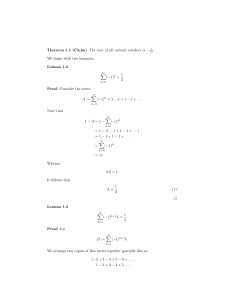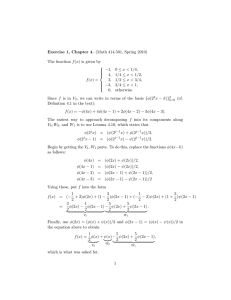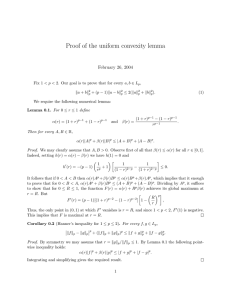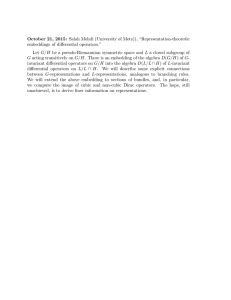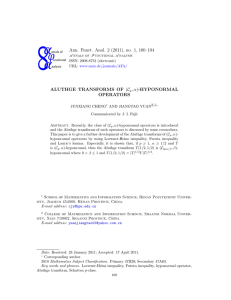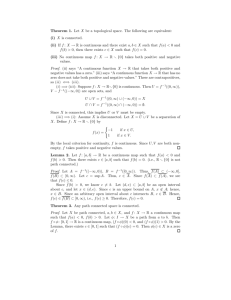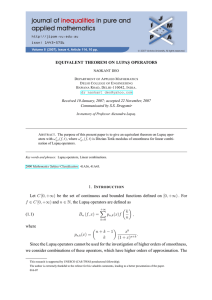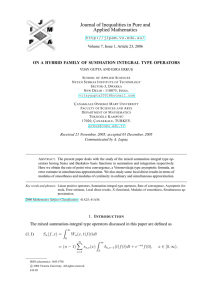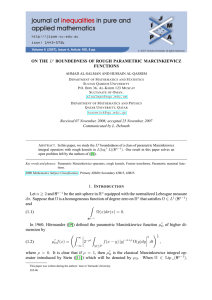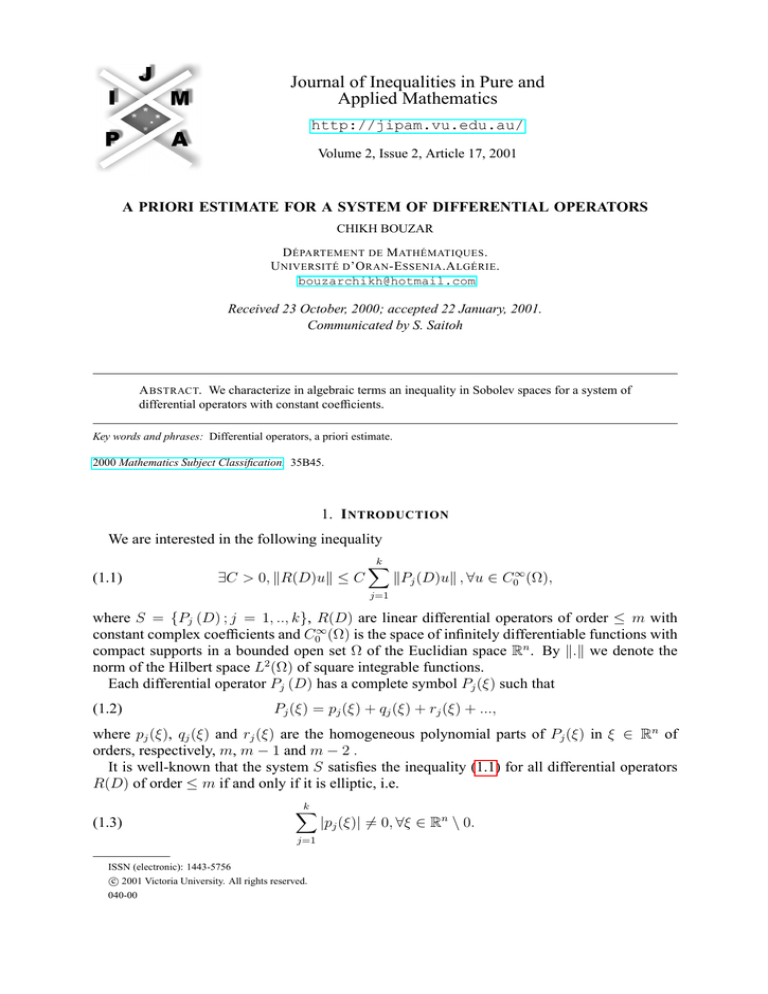
Journal of Inequalities in Pure and
Applied Mathematics
http://jipam.vu.edu.au/
Volume 2, Issue 2, Article 17, 2001
A PRIORI ESTIMATE FOR A SYSTEM OF DIFFERENTIAL OPERATORS
CHIKH BOUZAR
D ÉPARTEMENT DE M ATHÉMATIQUES .
U NIVERSITÉ D ’O RAN -E SSENIA .A LGÉRIE .
bouzarchikh@hotmail.com
Received 23 October, 2000; accepted 22 January, 2001.
Communicated by S. Saitoh
A BSTRACT. We characterize in algebraic terms an inequality in Sobolev spaces for a system of
differential operators with constant coefficients.
Key words and phrases: Differential operators, a priori estimate.
2000 Mathematics Subject Classification. 35B45.
1. I NTRODUCTION
We are interested in the following inequality
(1.1)
∃C > 0, kR(D)uk ≤ C
k
X
kPj (D)uk , ∀u ∈ C0∞ (Ω),
j=1
where S = {Pj (D) ; j = 1, .., k}, R(D) are linear differential operators of order ≤ m with
constant complex coefficients and C0∞ (Ω) is the space of infinitely differentiable functions with
compact supports in a bounded open set Ω of the Euclidian space Rn . By k.k we denote the
norm of the Hilbert space L2 (Ω) of square integrable functions.
Each differential operator Pj (D) has a complete symbol Pj (ξ) such that
(1.2)
Pj (ξ) = pj (ξ) + qj (ξ) + rj (ξ) + ...,
where pj (ξ), qj (ξ) and rj (ξ) are the homogeneous polynomial parts of Pj (ξ) in ξ ∈ Rn of
orders, respectively, m, m − 1 and m − 2 .
It is well-known that the system S satisfies the inequality (1.1) for all differential operators
R(D) of order ≤ m if and only if it is elliptic, i.e.
(1.3)
k
X
j=1
ISSN (electronic): 1443-5756
c 2001 Victoria University. All rights reserved.
040-00
|pj (ξ)| =
6 0, ∀ξ ∈ Rn \ 0.
2
C HIKH B OUZAR
In this paper we give an necessary and sufficient algebraic condition on the system S such
that it satisfies the inequality (1.1) for all differential operators R(D) of order ≤ m − 1.
The estimate (1.1) has been used in our work [1], without proof, in the study of local estimates
for certain classes of pseudodifferential operators.
2. T HE R ESULTS
To prove the main theorem we need some lemmas. The first one gives an algebraic characterization of the inequality (1.1) based on a well-known result of Hörmander [3].
Recall the Hörmander function
!1
X (α) 2 2
,
(2.1)
Pej (ξ) =
P (ξ)
j
α
(α)
where Pj (ξ) =
∂ |α|
α1
αn
∂ξ1 ...∂ξn
Pj (ξ), (see [3]) .
Lemma 2.1. The inequality (1.1) holds for every R(D) of order ≤ m − 1 if and only if
m−1
∃C > 0, |ξ|
(2.2)
≤C
k
X
Pej (ξ) , ∀ξ ∈ Rn .
j=1
Proof. The proof of this lemma follows essentially from the classical one in the case of k = 1,
and it is based on Hörmander’s inequality (see [3, p. 7]).
The scalar product in the complex Euclidian space C k of A = (a1 , .., ak ) and B = (b1 , .., bk )
P
is denoted as usually by A · B = ki=1 ai bi , and the norm of C k by |·| .
Let, by definition,
|A ∧ B|2 =
(2.3)
k
X
|ai bj − bi aj |2 .
i<j
The next lemma is a consequence of the classical Lagrange’s identity (see [2]).
Lemma 2.2. Let A = (a1 , .., ak ) ∈ C k and B = (b1 , .., bk ) ∈ C k , then
2
Re (A · B)
|Im (A · B)|2 + |A ∧ B|2
2
(2.4)
|At + B| = |A| t +
+
, ∀t ∈ R.
|A|
|A|2
Proof. We have
|At + B|2 = (|A| t)2 + 2tRe (A · B) + |B|2
2
2
Re (A · B)
Re (A · B)
2
+ |B| −
.
=
|A| t +
|A|
|A|
We obtain (2.4) from the next classical Lagrange’s identity
|A|2 |B|2 = |Re (A · B)|2 + |Im (A · B)|2 + |A ∧ B|2 .
For ξ ∈ Rn we define the vector functions
(2.5)
A(ξ) = (p1 (ξ), .., pk (ξ)) and B(ξ) = (q1 (ξ), .., qk (ξ)).
J. Inequal. Pure and Appl. Math., 2(2) Art. 17, 2001
http://jipam.vu.edu.au/
A P RIORI E STIMATE FOR
A
S YSTEM OF D IFFERENTIAL O PERATORS
3
Let
(
Ξ=
(2.6)
ω ∈ S n−1 : |A(ω)|2 =
k
X
)
|pj (ω)|2 6= 0 ,
j=1
where S
n−1
n
is the unit sphere of R , and
F (t, ξ) = |gradA(ξ)|2 + |A(ξ)t + B(ξ)|2 ,
(2.7)
P
where |grad A(ξ)|2 = kj=1 |grad pj (ξ)|2 .
Lemma 2.3. The inequality (2.2) holds if and only if there exist no sequences of real numbers
tj −→ +∞ and ωj ∈ S n−1 such that
F (tj , ωj ) −→ 0.
(2.8)
Proof. Let tj be a sequence of real numbers and ωj a sequence of S n−1 , using the homogeneity
of the functions p, q and r, then (2.2) is equivalent to
|tj ωj |2(m−1)
1
=
≤ C,
k
k
P
Pe
1
2
Pl (tj ωj )
F (tj , ωj ) + 2 Re (pl (ωj ).rl (ωj )) + χ(ωj ).O( tj )
l=1
l=1
where χ is a bounded function. Hence it is easy to see Lemma 2.3.
If ω ∈ Ξ we define the function G by
|Im (A(ω) · B(ω))|2 + |A(ω) ∧ B(ω)|2
.
|A(ω)|2
Theorem 2.4. The estimate (1.1) holds if and only if
G(ω) = |gradA(ω)|2 +
∃C > 0, G(ω) ≥ C, ∀ω ∈ Ξ
(2.9)
Proof. All positive constants are denoted by C. If (2.9) holds then from (2.4) and (2.7) we have
(2.10)
F (t, ω) =
Re (A(ω).B(ω))
|A(ω)| t +
|A(ω)|
2
+ G(ω) ≥ C, ∀ω ∈ Ξ, ∀t ≥ 0.
The vector function A is analytic and the set Ξ is dense in S n−1 , therefore by continuity we
obtain
F (t, ω) ≥ C, ∀t ≥ 0, ∀ω ∈ S n−1 .
(2.11)
ξ
and t = |ξ| in (2.11), as the vector functions A and B are homogeneous,
For ξ ∈ Rn , set ω = |ξ|
we obtain
|A(ξ) + B(ξ)|2 + |gradA(ξ)|2 ≥ C |ξ|2(m−1) , ∀ξ ∈ Rn ,
and then, for |ξ| ≥ C, we have
(2.12)
k
X
m−2 |Pj (ξ)|2 + |gradPj (ξ)|2 + O 1 + |ξ|2
≥ C |ξ|2(m−1) .
j=1
From the last inequality we easily get (2.2) of Lemma 2.1.
Suppose that (2.9) does not hold, then there exists a sequence ωj ∈ Ξ such that G(ωj ) −→ 0,
i.e.
(2.13)
J. Inequal. Pure and Appl. Math., 2(2) Art. 17, 2001
|gradA(ωj )|2 → 0,
http://jipam.vu.edu.au/
4
C HIKH B OUZAR
and
(2.14)
|Im (A(ωj ).B(ωj ))|2 + |A(ωj ) ∧ B(ωj )|2
→ 0.
|A(ωj )|2
As S n−1 is compact we can suppose that ωj −→ ω0 ∈ S n−1 . Hence, from (2.14) and (2.4)
with t = 0, we obtain
Re (A(ωj ).B(ωj ))
(2.15)
−→ ± |B(ω0 )| .
|A(ωj )|
From (2.13), due to Euler’s identity for homogeneous functions,
→
−
(2.16)
A(ω0 ) = 0 .
Now if B(ω0 ) = 0 then F (t, ω0 ) ≡ 0, which contradicts (2.8).
Let B(ω0 ) 6= 0, and suppose that
Re (A(ωj ).B(ωj ))
(2.17)
−→ − |B(ω0 )| ,
|A(ωj )|
|B(ω )|
then setting tj = |A(ωjj )| in (2.10), it is clear that tj −→ +∞, so, with G(ωj ) −→ 0, F (tj , ωj )
will converge to 0, which contradicts (2.8).
If
Re (A(ωj ).B(ωj ))
−→ + |B(ω0 )| ,
|A(ωj )|
then changing ωj to −ωj and using the homogeneity of the functions A and B, we obtain the
same conclusion.
R EFERENCES
[1] C. BOUZAR, Local estimates for pseudodifferential operators, Doklady Nats. Akad. Nauk Belarusi,
44(4) (2000), 18–20. (in Russian)
[2] G. HARDY, J. LITTLEWOOD AND G. POLYA, Inequalities, Cambridge Univ. Press, 2nd Ed., 1967.
[3] L. HÖRMANDER, The Analysis of Partial Differential Operators, T.II, Springer-Verlag. 1983.
J. Inequal. Pure and Appl. Math., 2(2) Art. 17, 2001
http://jipam.vu.edu.au/

